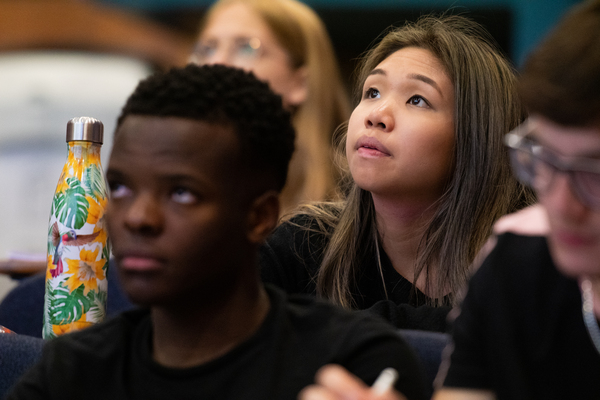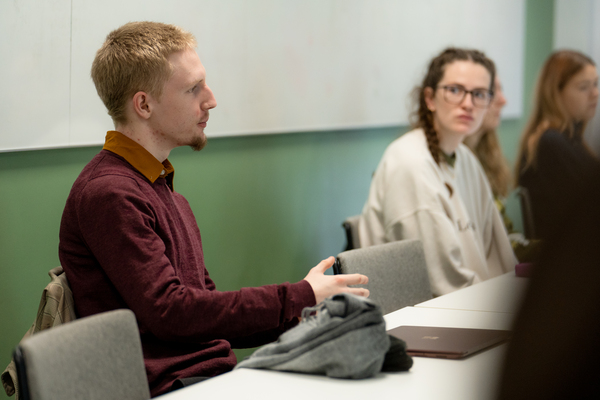
MSc Social Media and Interactive Technologies
Designing at the forefront of communication technology
Year of entry: 2026 (September)
The rapid expansion of digital networks have changed user expectations, creating demand for graduates who understand social and participatory design principles.
This course provides an innovative mix of sociological and technical skills. You will gain an understanding of the social, political and economic factors that affect the use of interactive technologies. You'll examine how technology is perceived and employed by the user. You'll learn to apply your knowledge to the practical problems of designing interactive pages, devices and systems.
The course offered me a unique opportunity to deepen my skills as a social scientist while studying across two of the best research departments in the UK.
MSc Social Media and Interactive Technologies
Course content
Modules explore topics in human-computer interaction, user-centred design, social and cultural theory and human psychology.
You'll learn from experts in the Department of Sociology and the Department of Computer Science, looking at interactive technologies through the key roles they play in society.
Modules
Core Modules
You will take core modules which may include:
- Understanding Social Media
- Qualitative Approaches to Investigating User Experience
- Interaction Design and Evaluation
- Social Media, Data and Society
- Researching Digital Life
- Human Factors: Technology in Context
Our modules may change to reflect the latest academic thinking and expertise of our staff, and in line with Department/School academic planning.
Dissertation
You will develop, design, implement and manage your own original research project, supervised by a member of staff with the relevant experience for your topic. You will analyse the data and produce a 10,000-word dissertation based on your research project.
Examples of previous projects include:
- Accessibility of iPhone/iPad apps
- Democracy and participation in York
- The use of social networking sites by the older generation
- Social robotics and companionship
- Living with the h-index?
- Investigating immersion in games with inattentional blindness
- Immersion and cognitive effort when playing videogames
- Immersion in audio-only games
Learning outcomes
Every course at York is built on a distinctive set of learning outcomes. These will give you a clear understanding of what you will be able to accomplish at the end of the course and help you explain what you can offer employers. Our academics identify the knowledge, skills, and experiences you'll need upon graduation and then design the course to get you there.
Learning outcomes for this course
- Combine appropriate theoretical and empirical methods from both sociology and computer science to respond to questions at the frontier of international and cross cultural social media knowledge to develop insights into both technical and social transformations.
- Deploy a comprehensive appreciation of contemporary research in understanding and responding to the complex relationships between social media and socio-cultural change.
- Utilise research in the areas of Human Computer Interaction and design practices, and to use this to design new technologies in a research, third sector or commercial career.
- Critically assess dynamic and specific contexts/tasks in the design, implementation and management of social media and interactive technologies by combining knowledge of social science theory, methodology and technology design techniques.
- Identify and explore emerging research and commercial ideas and assess their value for improving social media and interactive technology from a social and user-centred perspective.
- Develop prototypes that would be suitable to evaluate user-centred designs for interactive system in a user-centred way and appropriate to the stage of the design process.
- Lead and collaborate within groups to realise effective teamwork, a thriving workplace, and successful project management.
- Analyse empirically gathered data and communicate findings from those data to non-technical, professional or academic partners.
Fees and funding
Annual tuition fees for 2026/27
| Study mode | UK (home) | International and EU |
|---|---|---|
| Full-time (1 year) | £12,500 | £28,600 |
Fees information
UK (home) or international fees? The level of fee that you will be asked to pay depends on whether you're classed as a UK (home) or international student. Check your fee status.
Find out more information about tuition fees and how to pay them.
Funding information
Discover your funding options to help with tuition fees and living costs.
We'll confirm more funding opportunities for students joining us in 2026/27 throughout the year.
If you've successfully completed an undergraduate degree at York you could be eligible for a 10% Masters fee discount.
Funding opportunities
Chevening Scholarships
We are pleased to work with Chevening Scholars to offer funding for our Masters programmes. Chevening Scholarships provide one year of fully-funded postgraduate study in the UK for international (including EU) students. The scholarships are open to early and mid-career professionals who have the potential to become future leaders.
Department scholarship information
Teaching and assessment
You’ll work with world‐leading academics who’ll challenge you to think independently and excel in all that you do. Our approach to teaching will provide you with the knowledge, opportunities, and support you need to grow and succeed in a global workplace.
Teaching format
You'll be taught through lectures, seminars, practical exercises and workshops. You’ll spend most of your time reading assigned texts and researching supporting materials on your own, discussing the readings and lectures in a group, and presenting work when requested. You'll be taught using a variety of methods in a range of formats including:
- lectures
- seminars
- directed reading
- workshops
- independent study
A member of the teaching staff will act as your supervisor throughout the degree to help guide your studies and monitor your progress.
Teaching location
You will be based in the Department of Sociology on Campus East. Most of your contact hours will be on Campus East.
About our campus
Our beautiful green campus offers a student-friendly setting in which to live and study, within easy reach of the action in the city centre. It's easy to get around campus - everything is within walking or pedalling distance, or you can always use the fast and frequent bus service.
Assessment and feedback
You will be assessed in a number of different ways, depending on the module you study.
Forms of assessment include portfolio work, essays and reflections. You will also complete a 10,000 word dissertation on a subject of your choice that relates to your programme.
You will also receive feedback on work that does not count towards your final grade such as group and individual presentations, helping you to understand your strengths and identify areas for improvement.
Careers and skills
You'll develop the skills and knowledge needed to play a leading role in the design and evaluation of interactive technologies in industry, commerce, academia and public service. This social media degree also provides an ideal basis to progress to further study at PhD level.
Career opportunities
- Social media consultant
- Software and hardware developer
- Web designer
- Information analyst
- Social media marketer
- Public relations officer
Transferable skills
- User-centred design experience
- Website development and design
- Data analysis
- Design and completion of original research
- Ability to think critically about social issues and design
Entry requirements
| Qualification | Typical offer |
|---|---|
| Undergraduate degree | 2:2 or equivalent qualifications or experience in Social sciences with experience of social aspects of computing; Business and Management Studies; or Computer Science with experience of social aspects of computing. |
| Other international qualifications | Equivalent qualifications from your country |
English language
If English isn't your first language you may need to provide evidence of your English language ability. We accept the following qualifications:
| Qualification | Minimum requirement |
|---|---|
| IELTS (Academic and Indicator) | 6.5, minimum 6.0 in each component |
| Cambridge CEFR | B2 First: 176, with 169 in each component |
| Oxford ELLT | 7, minimum of 6 in each component |
| Oxford Test of English Advanced | 136, minimum 126 in each component |
| Duolingo | 120, minimum 105 in all other components |
| LanguageCert SELT | B2 with 33/50 in each component |
| LanguageCert Academic | 70 with a minimum of 65 in each component |
| Kaplan Test of English Language | 478-509, with 444-477 in all other components |
| Skills for English | B2: Merit overall, with Pass with Merit in each component |
| PTE Academic | 61, minimum 55 in each component |
| TOEFL | 87, minimum of 21 in each component |
| Trinity ISE III | Merit in all requirements |
For more information see our postgraduate English language requirements.
If you haven't met our English language requirements
You may be eligible for one of our pre-sessional English language courses. These courses will provide you with the level of English needed to meet the conditions of your offer.
The length of course you need to take depends on your current English language test scores and how much you need to improve to reach our English language requirements.
After you've accepted your offer to study at York, we'll confirm which pre-sessional course you should apply to via You@York.
Next steps
Contact us
Get in touch if you have any questions

Department
Related courses
Discover York







